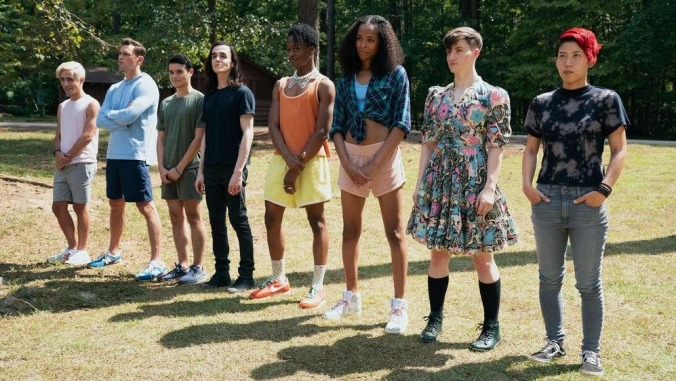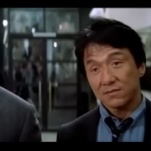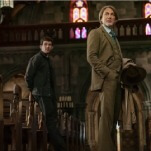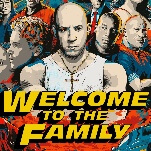They/Them wrestles with its own queer horror identity crisis
Writer-director John Logan (Skyfall, Gladiator) portrays conversion therapy as appropriately horrific, but doesn't deliver on transformative cinematic thrills

Queerness is so enmeshed in the cinematic roots of horror that the two are virtually inseparable, but it’s only recently that the connection has been explored more explicitly in its characters and stories, after being submerged metaphorically or thematically in the vestiges of a bigoted, repressive past. In that sense, a film like They/Them is an inevitability, reframing queer life in America through cinematic tropes of horror that provided a refuge for many in that particular community. The moments when it succeeds at commenting on continuing anti-LGBT travesties feel like a landmark of queer cinema, proudly planting a pride flag in the horror genre’s fertile fields. Unfortunately, They/Them’s biggest stumbles come from a crisis of identity—not in its characters or queer themes, but in the genre conventions it employs, misunderstanding the opportunities its storytelling affords.
Written and directed by John Logan, They/Them—pronounced “They Slash Them,” get it?—highlights a week at a conversion therapy camp, headed by the charming but enigmatic Owen Whistler (Kevin Bacon). After an introductory monologue shockingly devoid of Bible-thumping hate speech, his division of campers into boys’ and girls’ cabins introduces us to Jordan (Theo Germaine), a non-binary trans person whose pronouns are they/them. Surprisingly, Whistler is understanding of Theo’s transition and requests that they bunk with the boys in the spirit of the camp’s ethos of communal growth. However, as the week progresses, Jordan and the other campers note that something feels off about this place as the camp attempts to live up to its faux-therapeutic reputation.
This overriding sense of wrongness is ultimately where They/Them most excels, creating a sense of dread as the initially inviting and apparently transparent operation invites campers to embrace a more “gender normative” lifestyle. This unease comes across in ways that are patently obvious, like when trans woman Alexandra (Quei Tann) is forced to bunk with the boys after her supposed “deception” about her gender. But the camp is much more insidious in how it draws upon and exploits feelings of adolescent shame.
A persistent refrain in interactions between counselors and campers is that misguided teenage angst drives these young adults toward a gay “lifestyle,” exemplified by characters like Kim (Anna Lore), a straight-passing young woman whose desire for normalcy is trumped by her attraction to women; Veronica (Monique Kim), a proclaimed self-hating bisexual; or Stu (Cooper Koch), an athlete who sees his attraction to men as a hindrance to his chances as a varsity competitor. Of course, there are those in the group who have been forced to attend at the whims of parents wielding rewards or ultimatums, like the fabulous Toby (Austin Crute), but there’s an underlying sense that these folks are attending the camp primarily because of an absence of love and acceptance from their families and communities.







































